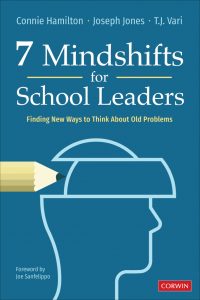
by theschoolhouse302 | Feb 9, 2022 | #SH302, Action, Communication, Core Values, Courage, Creativity, Culture, Daily Habits, Decision-Making, Disruption, Feedback, Goal Setting, Leadership, Learning to Lead, Listening, Long-Term Decision-Making, Meeting Management, Mental Mapping, Organizational Leadership, Planning and Preparation, Positivity, Principal Leadership, Principals, Relationships, Resilience, Results, Service Leadership, Systems Thinking, Teacher Leadership, Teamwork
Trust dies but mistrust blossoms.
~ Sophocles
School Leaders: The Value of Trust in Schools
Trust is vital to the success of any school and is at the center of every positive, working relationship. The central role of trust is that it allows people to depend on one another and to operate without worry or fear, two emotions that will stifle any organization. The power of trust is that it allows the school to move forward faster in every way possible, especially with change initiatives that are set to improve results.
As principal leaders, there are five powerful domains that school and district administrators must focus on for improved student achievement:
- Leading teaching learning and development
- Ensuring quality teaching
- Establishing goals and expectations
- Strategic resourcing
- Hiring and retaining talented staff
We can spend our time in many areas, doing a lot of different things, but if you want to maximize your efforts as a leader, your daily work will fall into these five domains. However, to be effective in all five, they each must be anchored through a culture of trust. Leaders who know how important this is are always trying to build this kind of environment for students and staff.
Building Trust in Schools
The problem with building trust for many school leaders is that it is masked within emotions. Trust is a belief. It can be elusive and even counterintuitive because it’s a house of cards, delicately built and easily destroyed. This requires a thorough understanding of trust and challenging what you think you know about it and accepting that what you believe about trust is probably wrong.
We’ll address the counterintuitive part in the next sections, but let’s be clear about what it means to have and build trust as a school leader. We always hear people say that “trust is earned.” That’s true of the leader but not for the leader. In other words, leaders need to earn the trust of others and teammates need to earn each others’ trust, but leaders earn trust by extending it–building relationships, demonstrating trust, respecting others, and being forthright. Great educational leaders trust in others even before it’s earned and only when it’s broken do they take it away.
Education is a people business. Don’t be fooled. All of the policies and procedures in the world won’t make a school a great place; people are the answer. Knowing this–recognizing that trust in schools is pivotal–is what turns good school leaders into great school leaders. It stems from everyone knowing their role, respecting one another’s work, and recognizing the relation of one role to all the other roles. Understanding the uniqueness of each is crucial in the running of an effective school. Trust builds and grows when everyone can discern that others are advancing the school’s priorities with the same effort and attitude that it takes to be successful. “These discernments tend to organize around four specific considerations: respect, personal regard, competence in core role responsibilities, and personal integrity.”
This also means that school leaders must address concerns with relationships when one of these four core considerations are broken. We have previously written about the 7 ways that school leaders build trust, which include the ability to rebuild it. Leaders who aren’t apt to strategically restore trust are usually hesitant due to a belief that they hold that is likely counterintuitive to building a trusting environment.
Why Trust is Mostly Counterintuitive
Trust is mostly counterintuitive in terms of the way we build it and work to maintain it with others. The core notion that many people hold about trust is that the way we strengthen relationships, and therefore build trust with others, is by being nice. While being nice is important and builds collegiality, it doesn’t instill or build trust. In fact, niceness can be weaponized by assuming or portraying that candor, dissonance, and tough conversations are examples of discord. Nice is confused with agreeable and quite frankly that’s the last thing a leader wants as the foundation of their culture. Worse yet, a culture of nice can breed complacency and incompetence, which erode trust at work.
Too often, we hear leaders say things like “we are a family” when they refer to their staff. Be careful when using these terms because they can confuse people and send the wrong message. School leaders may try to use this type of messaging to leverage relationships, rather than truly building them on trust. Having a family feel, closeness, and togetherness is critical, but it shouldn’t overshadow performance, standards, and accountability.
We’re reminded that Covey’s 13 High Trust Behaviors for leaders include “talk straight,” “confront reality,” “clarify expectations,” and “practice accountability.” Most of the high trust behaviors that leaders must put on display are more about candor, transparency, commitments, and competence than about being nice. Anyone can go around being nice and pretending to be supportive, hoping that it will lead to a positive relationship, but effective leaders deliver results and hold others to a standard that delivers results as well. The biggest problem with trust is that it’s misunderstood and, therefore, we can easily learn bad habits. Let’s take a look at three tips for building trust that don’t work at all and may even be working against the school culture you’re trying to build.
The 3 Worst Tips about Building Trust in Schools
Build Relationships, First
“Listen, don’t come out of the gate too fast. Get to know people, build relationships, and then set the tone for your leadership.” This is thought to be sage advice for leaders entering a new situation or environment, but it is dead wrong, and we hear it all the time. In fact, this is usually the advice given to new school leaders–coaches, assistant principals, and principals. It’s also what gets new leaders off to the worst start to actually building a winning team.
Relationships are important in schools, and they should be built professionally, grounded in the core values of the school. The last thing we want is for teachers to build friendships with students that blur the lines between educator and pupil, and the relationships between administrators and teachers are no different. Granted, incredible friendships grow over years of service with one another, but that should happen organically–fortified through the desire to build an incredible school, working through tough times, and meeting challenges and demands. Those are the situations that can strengthen any bond, but you don’t “build relationships, first.” They actually come second–after we’ve done hard work together.
Consider domain three, Establishing goals & expectations, as the foundation for building trust. Leaders who communicate a clear vision, demonstrate a strategic way for everyone to meet high expectations, and ultimately get results, are the ones who garner trust and deep working relationships. It comes down to whether or not we can see where they’re going and if we want to go there too.
Building Trust the Right Way: Trust Tip for Principal Leaders
The number one thing that school leaders can do to build trust on the team is to create a shared vision and keep it at the forefront of every decision. This school year, many schools embraced the idea of accelerated learning–getting to the core of what needed to be taught in classrooms. Why? “Researchers found that when teachers took an accelerated-learning approach in math, students completed 27 percent more grade-level lessons, and struggled less with content, than students in classrooms where teachers used remediation.” Leaders who build and develop trust continually maintain the focus on student achievement and protect teachers’ time to do so. They’re not inconsistent with their expectations and they don’t meander from one initiative to the next without a central focus for what they want to accomplish.
Only Focus on Strengths
It’s a major mistake to think that you can only focus on the strengths of the people on the team as a way to build trust and get better. We have to be willing to have the tough conversations and tackle the difficult issues. Trust us, we believe in Soaring with Your Strengths and we don’t knock strengths-based leadership. Most people will become stronger faster in areas of life and work where their aptitude is high. But that doesn’t mean that weaknesses and shortcomings should be ignored.
To build on a person’s strengths and weaknesses, communication is the clear driver. At work, this begins with candid and compassionate feedback. In fact, it is wise for leaders to spend as much of their time as possible working with staff, conducting observations, holding listening tours, digging into the data, and reviewing performance results. Feedback is one of the most important aspects of quality leadership.
Consider domain two, Ensuring quality teaching, which is driven by feedback conversations. Think about initiating Reading Across the Curriculum to improve reading among students who are behind a grade level, yet a teacher refuses to adopt some of the new strategies that are profoundly more effective than old ones, like Drop Everything and Read. The teacher builds strong connections with students, which is terrific, but relationships alone don’t improve one’s ability to read. School leaders need to have tough conversations that tackle weaknesses, not just strengths.
Building Trust the Right Way: Trust Tip for Principal Leaders
One of the most important things that school leaders can do if they want to build a trusting environment is to learn to provide quality feedback. Whenever you doubt yourself, just think of your very best teachers. They always crave feedback. They want to get better. They invite you in to see a new lesson. They experiment and try new strategies. Why? It’s not about them; they want to get better for the sake of their students. Effective school leaders know that quality feedback is how professionals grow.
Treat Everyone the Same
Maybe the worst thing you can do as a school leader is to confuse fair treatment with equal treatment, but we see it all the time. Differentiation is not just for students. Great school leaders understand that school teams are composed of individuals with different needs who possess a different set of skills. This is actually what leads to many teachers’ frustration–a generalized approach when meeting their needs. One size does not fit all.
Please don’t confuse this with favoritism. Having besties, building cliques, and leveraging friendships may be prominent in middle school, but they have no role in the workplace. Rather, we are referring to school leaders developing a keen awareness of the skill sets of their staff, resources they need for further development, and a pulse on the climate of the school and district.
Consider domain four, Strategic resourcing, to build trust. Ensuring every teacher has functioning technology is critical. Yet, some departments and subjects demand different resources and tools that enhance student learning. Consider a platform like formative for math teachers. Not every teacher may need it, but being able to track data in real time, assess students’ skills, and provide timely feedback is the hallmark of any great formative assessment. Great leaders listen to their teachers and use resources to support them which ultimately supports students.
Building Trust the Right Way: Trust Tip for Principal Leaders
Just as counterintuitive as any other trust-building factor is that all staff are treated the same. Consider the staff member who’s weaknesses eclipse their strengths. Even the greatest tools, like formatives, aren’t being used and student growth is stagnant. This is when great school leaders confront the problem head-on with that particular staff member. They don’t throw the monkey blanket on everyone, as Todd Whitaker would say, accusing everyone of underperformance. Rather, school leaders who operate within trusting relationships are straightforward with the individual, they enact a plan of support, mirrored by progressive discipline if necessary. They confront problems and alter scenarios.
Walk the Walk and Build The Strongest Bonds of Trust in Your School
The very best school leaders are sound instructional leaders who can lead professional development. Their knowledge of effective instructional strategies, methods to build strong relationships with students, and ability to keep teaching and learning at the forefront of every decision is what builds trust far more than anything else. Effective leaders learn to strengthen relationships by doing the work, not before, by helping everyone to understand their strengths at the same time developing new skills, and by differentiating the supports that we put in place based on individual needs. You can be a school leader who builds a culture of trust each day, but don’t fall prey to the counterintuitive aspects of trust that plague school leaders who have the right intention but who don’t accomplish their intended outcomes.
As always, let us know what you think of this with a like, a follow, or a comment. Find us on Twitter, YouTube, iTunes, Facebook, & SoundCould. And, again, if you want one simple model for leading better and growing faster per month, follow this blog by entering your email at the top right of the screen.
TheSchoolHouse302 is about getting to simple by maximizing effective research-based strategies that empower individuals to lead better and grow faster.
Joe & T.J.
This blog post was brought to you by GhostBed, a family-owned business of sleep experts with 20+ years of experience. With 30K+ 5-star reviews, you can’t go wrong with GhostBed. Their mattresses are handcrafted, and they come with a 101-night-at-home-sleep trial. For a limited time, you can get 30% by using our code — SH302 — at checkout. And, even if you tell someone about GhostBed, you can earn a $100 referral reward. Go to Ghostbed.com today and use SH302 at checkout.










 7 Mindshifts for School Leaders: Finding New Ways to Think About Old Problems.
7 Mindshifts for School Leaders: Finding New Ways to Think About Old Problems. 


